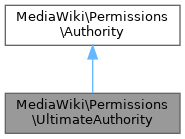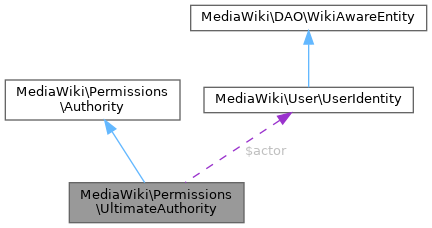Represents an authority that has all permissions. More...


Public Member Functions | ||||||||||
| __construct (UserIdentity $actor) | ||||||||||
| authorizeRead (string $action, PageIdentity $target, PermissionStatus $status=null) | ||||||||||
Authorize read access.This should be used immediately before performing read access on restricted information.Calling this method may have non-trivial side-effects, such as incrementing a rate limit counter.
| ||||||||||
| authorizeWrite (string $action, PageIdentity $target, PermissionStatus $status=null) | ||||||||||
Authorize write access.This should be used immediately before updating persisted information.Calling this method may have non-trivial side-effects, such as incrementing a rate limit counter.
| ||||||||||
| definitelyCan (string $action, PageIdentity $target, PermissionStatus $status=null) | ||||||||||
Checks whether this authority can perform the given action on the given target page.This method performs a thorough check, but does not protect against race conditions. It is intended to be used when a user is intending to perform an action, but has not yet committed to it. For example, when a user goes to the edit page of an article, this method may be used to determine whether the user should be presented with a warning and a read-only view instead.
| ||||||||||
| getBlock (int $freshness=self::READ_NORMAL) | ||||||||||
| getUser () | ||||||||||
| The user identity associated with this authority. | ||||||||||
| isAllowed (string $permission) | ||||||||||
Checks whether this authority has the given permission in general.For some permissions, exceptions may exist, both positive and negative, on a per-target basis.
| ||||||||||
| isAllowedAll (... $permissions) | ||||||||||
Checks whether this authority has any of the given permissions in general.Implementations must ensure that this method returns false if isAllowed would return false for any of the given permissions. Calling isAllowedAll() with one parameter must be equivalent to calling isAllowed(). Calling isAllowedAny() with no parameter is not allowed.
| ||||||||||
| isAllowedAny (... $permissions) | ||||||||||
Checks whether this authority has any of the given permissions in general.Implementations must ensure that this method returns true if isAllowed would return true for any of the given permissions. Calling isAllowedAny() with one parameter must be equivalent to calling isAllowed(). Calling isAllowedAny() with no parameter is not allowed.
| ||||||||||
| probablyCan (string $action, PageIdentity $target, PermissionStatus $status=null) | ||||||||||
Checks whether this authority can probably perform the given action on the given target page.This method offers a fast, lightweight check, and may produce false positives. It is intended for determining which UI elements should be offered to the user.
| ||||||||||
Private Attributes | |
| UserIdentity | $actor |
Detailed Description
Represents an authority that has all permissions.
This is intended for use in maintenance scripts and tests.
@newable
- Since
- 1.36
Definition at line 35 of file UltimateAuthority.php.
Constructor & Destructor Documentation
◆ __construct()
| MediaWiki\Permissions\UltimateAuthority::__construct | ( | UserIdentity | $actor | ) |
- Stability: stable
- to call
- Parameters
-
UserIdentity $actor
Definition at line 44 of file UltimateAuthority.php.
References MediaWiki\Permissions\UltimateAuthority\$actor.
Member Function Documentation
◆ authorizeRead()
| MediaWiki\Permissions\UltimateAuthority::authorizeRead | ( | string | $action, |
| PageIdentity | $target, | ||
| PermissionStatus | $status = null |
||
| ) |
Authorize read access.This should be used immediately before performing read access on restricted information.Calling this method may have non-trivial side-effects, such as incrementing a rate limit counter.
- Parameters
-
string $action PageIdentity $target PermissionStatus | null $status aggregator for failures
- Returns
- bool
- Parameters
-
string $action PageIdentity $target PermissionStatus | null $status
- Returns
- bool
Implements MediaWiki\Permissions\Authority.
Definition at line 145 of file UltimateAuthority.php.
◆ authorizeWrite()
| MediaWiki\Permissions\UltimateAuthority::authorizeWrite | ( | string | $action, |
| PageIdentity | $target, | ||
| PermissionStatus | $status = null |
||
| ) |
Authorize write access.This should be used immediately before updating persisted information.Calling this method may have non-trivial side-effects, such as incrementing a rate limit counter.
- Parameters
-
string $action PageIdentity $target PermissionStatus | null $status aggregator for failures
- Returns
- bool
- Parameters
-
string $action PageIdentity $target PermissionStatus | null $status
- Returns
- bool
Implements MediaWiki\Permissions\Authority.
Definition at line 162 of file UltimateAuthority.php.
◆ definitelyCan()
| MediaWiki\Permissions\UltimateAuthority::definitelyCan | ( | string | $action, |
| PageIdentity | $target, | ||
| PermissionStatus | $status = null |
||
| ) |
Checks whether this authority can perform the given action on the given target page.This method performs a thorough check, but does not protect against race conditions. It is intended to be used when a user is intending to perform an action, but has not yet committed to it. For example, when a user goes to the edit page of an article, this method may be used to determine whether the user should be presented with a warning and a read-only view instead.
- Parameters
-
string $action PageIdentity $target PermissionStatus | null $status aggregator for failures
- Returns
- bool
- Parameters
-
string $action PageIdentity $target PermissionStatus | null $status
- Returns
- bool
Implements MediaWiki\Permissions\Authority.
Definition at line 128 of file UltimateAuthority.php.
◆ getBlock()
| MediaWiki\Permissions\UltimateAuthority::getBlock | ( | int | $freshness = self::READ_NORMAL | ) |
- Parameters
-
int $freshness
- Returns
- ?Block always null
- Since
- 1.37
Implements MediaWiki\Permissions\Authority.
Definition at line 63 of file UltimateAuthority.php.
◆ getUser()
| MediaWiki\Permissions\UltimateAuthority::getUser | ( | ) |
The user identity associated with this authority.
- Returns
- UserIdentity
Implements MediaWiki\Permissions\Authority.
Definition at line 53 of file UltimateAuthority.php.
◆ isAllowed()
| MediaWiki\Permissions\UltimateAuthority::isAllowed | ( | string | $permission | ) |
Checks whether this authority has the given permission in general.For some permissions, exceptions may exist, both positive and negative, on a per-target basis.
- Parameters
-
string $permission
- Returns
- bool
- Returns
- bool
Implements MediaWiki\Permissions\Authority.
Definition at line 72 of file UltimateAuthority.php.
◆ isAllowedAll()
| MediaWiki\Permissions\UltimateAuthority::isAllowedAll | ( | $permissions | ) |
Checks whether this authority has any of the given permissions in general.Implementations must ensure that this method returns false if isAllowed would return false for any of the given permissions. Calling isAllowedAll() with one parameter must be equivalent to calling isAllowed(). Calling isAllowedAny() with no parameter is not allowed.
- See also
- isAllowed
- Parameters
-
string ...$permissions Permissions to test. At least one must be given.
- Returns
- bool True if the user is allowed to perform all of the given actions
- Returns
- bool
Implements MediaWiki\Permissions\Authority.
Definition at line 94 of file UltimateAuthority.php.
◆ isAllowedAny()
| MediaWiki\Permissions\UltimateAuthority::isAllowedAny | ( | $permissions | ) |
Checks whether this authority has any of the given permissions in general.Implementations must ensure that this method returns true if isAllowed would return true for any of the given permissions. Calling isAllowedAny() with one parameter must be equivalent to calling isAllowed(). Calling isAllowedAny() with no parameter is not allowed.
- See also
- isAllowed
- Parameters
-
string ...$permissions Permissions to test. At least one must be given.
- Returns
- bool True if user is allowed to perform any of the given actions
- Returns
- bool
Implements MediaWiki\Permissions\Authority.
Definition at line 81 of file UltimateAuthority.php.
◆ probablyCan()
| MediaWiki\Permissions\UltimateAuthority::probablyCan | ( | string | $action, |
| PageIdentity | $target, | ||
| PermissionStatus | $status = null |
||
| ) |
Checks whether this authority can probably perform the given action on the given target page.This method offers a fast, lightweight check, and may produce false positives. It is intended for determining which UI elements should be offered to the user.
- Parameters
-
string $action PageIdentity $target PermissionStatus | null $status aggregator for failures
- Returns
- bool
- Parameters
-
string $action PageIdentity $target PermissionStatus | null $status
- Returns
- bool
Implements MediaWiki\Permissions\Authority.
Definition at line 111 of file UltimateAuthority.php.
Member Data Documentation
◆ $actor
|
private |
Definition at line 38 of file UltimateAuthority.php.
Referenced by MediaWiki\Permissions\UltimateAuthority\__construct().
The documentation for this class was generated from the following file:
- includes/Permissions/UltimateAuthority.php